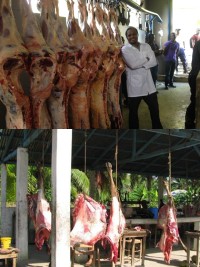|
|
|

Haiti - Agriculture : Towards the modernization of slaughterhouses
03/03/2015 12:37:03
Domestic production of cattle meat, estimated at 47,000 tons annually with sustained annual growth of 1%, covers 95% of current demand. However, the conditions of slaughter of animals and the marketing of the meat are deplorable, despite significant investments of the Government, in the 90s for the construction of 18 slaughterhouses.
The construction of new modern infrastructure of slaughter and the development of existing slaughterhouses and existing slaughter places, the establishment of a functional veterinary inspection system and the marketing of meat products in sanitary conditions are urgent and necessary. However, to avoid repeating the mistakes of the past, we need reforms in this sector are based on technical studies to date. To ensure the safety of meat products, a profound reform of animal slaughter conditions, providing the restoration of the health inspection and the modernization of infrastructure is essential.
Actions already taken :
- In 2013 and 2014, with the Board of directors of 557 communal sections and the municipal boards of the 140 municipalities in the country, a large inventory of public and private point of slaughter of the animals, was carried out on the entire country. 500 points were listed where the slaughter of cattle will now be checked.;
- An accreditation process of about 300 slaughter controllers responsible for health inspections began in 2013 ;
- In December 2014, the control of the slaughter of cattle became effective on all the territory of the North and Northeast departments and was initiated within the 8 other departments ;
- A general study of the chain of supply of meat has been programmed, which will allow to:
- Define and characterize the supply and demand for meat in the domestic market,
- Propose slaughterhouse models to implement in the country to meet the needs of the population,
- Make practical recommendations on appropriate institutional arrangements to put in place to ensure the sustainable management of slaughterhouses
- Propose standards for ensuring a satisfactory level of safety of meat products put in the marketing channels and mechanisms to facilitate the implementation of these standards.
With the support of the program "KONEKTE" funded by the US Agency for International Development (USAID), three high-level consultants were hired to conduct the study on the chain of supply of meat and the modernization of slaughterhouses. The control of slaughter coming downstream of cattle identification program that the Ministry put in place, is the basis of the traceability system in the sector.
Perspectives :
- By the first quarter of 2015, the 300 accredited veterinarians agents for control of slaughter will all operational and in all the main points of slaughter cattle of the country ;
- In-depth study on the chain of supply of meat and slaughterhouse models to implement in the country, will also be produced in the first quarter of 2015. The administration of KONEKTE will have to performing background checks on consultants and after verification, USAID will give permission to officially launch the study ;
- MARNDR will continue its support to the private sector to facilitate investment in the modernization of slaughterhouses and the marketing chain of meat in general ;
- The Ministry will have to continue consultations with the Ministry of Industry and Trade and the Ministry of Public Health and Population to progress on the issue of modernization of meat marketing standards (post-slaughter circuits) and their application.
HL/ HaitiLibre
|
|
|
|



